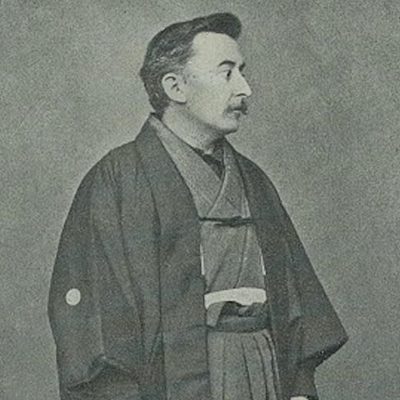Patrick Lafcadio Hearn, Japan’s national poet from Lefkada, is the subject of this episode of “Soil of my Soul”, broadcast on Thursday, August 4th on the Voice of Greece.
Takis Efstathiou, the man who brought Lafcadio Hearn to his place of birth and has one of the largest collections of his works, speaks about him. First editions, rare books, and Japanese collectibles…
Despoina Zernioti, Director of the Museum of Asian Art in Corfu also speaks about him.
The Irish-Greek poet, who was born in 1850 in Lefkada and died in 1904 in Tokyo, is best known for his books on Japan, and especially for his collections of Japanese legends and ghost stories. In the US, Lafcadio Hearn is famous for his writings about the city of New Orleans, based on his ten-year stay there.
Lafcadio Hearn was born in Lefkada on June 27, 1850. He was the son of an Irish officer of the British Army and Rosa Cassimati, who came from the Greek island of Kythira. After his parents’ divorce, he is brought up by his father’s aunt in Dublin. At the age of 16, he loses sight in his left eye in an accident, and his father’s death follows shortly afterwards.
A year later, due to his aunt’s bankruptcy, he is forced to quit school. At the age of 19, he moves to Cincinnati, Ohio, USA, where, five years later, he becomes a journalist. In 1877 Hearn goes to New Orleans to write a series of articles, and remains there for 10 years. Being relatively well known for his literary translations and articles, he is hired by Harper Publishing Co. His first two novellas are written between 1877-89, while he is on assignment in the West Indies for Harper magazine.
In 1899, he decides to go to Japan and, upon his arrival in Yokohama in the spring of 1890, he develops a friendly relationship with Basil Hall Chamberlain, a professor at Tokyo Imperial University, as well as with officers in the Ministry of Education. With their encouragement, in the summer of 1890, he moves to Matsue, to teach English at the Shimane Prefectural Common Middle School & Normal School. There he meets the Governors of Shimane, Koteda Yasusada and Sentaro Nishida, and later marries Setsu Koizumi, daughter of a samurai.
Today, his residences in Japan, New Orleans, and Dublin are historic landmarks. In Lefkada, the house where he was born retains a strong imprint of his presence.
In the heart of the Far East, he worked as an English teacher and writer, until his death at the age of 54. There he narrated traditional stories, dark myths, strange beliefs of cold nights among ghosts, young samurai and bloodied swords
He describes in “THE DREAM OF A SUMMER DAY”: “at last there came a parting day; and she wept, and told me of a charm she had given me that I must never, never lose, because it would keep me young, and give me power to return. But I never returned. And the years went by; and one day I knew that I had lost the charm, and had become hopelessly old.” She too had died, on December 12, 1882, in the Psychiatric Hospital of Corfu.
The poet from Lefkada, who gave the Japanese their myths, passed away on September 26, 1904. Curated and presented by: Angelos Stathopoulos
